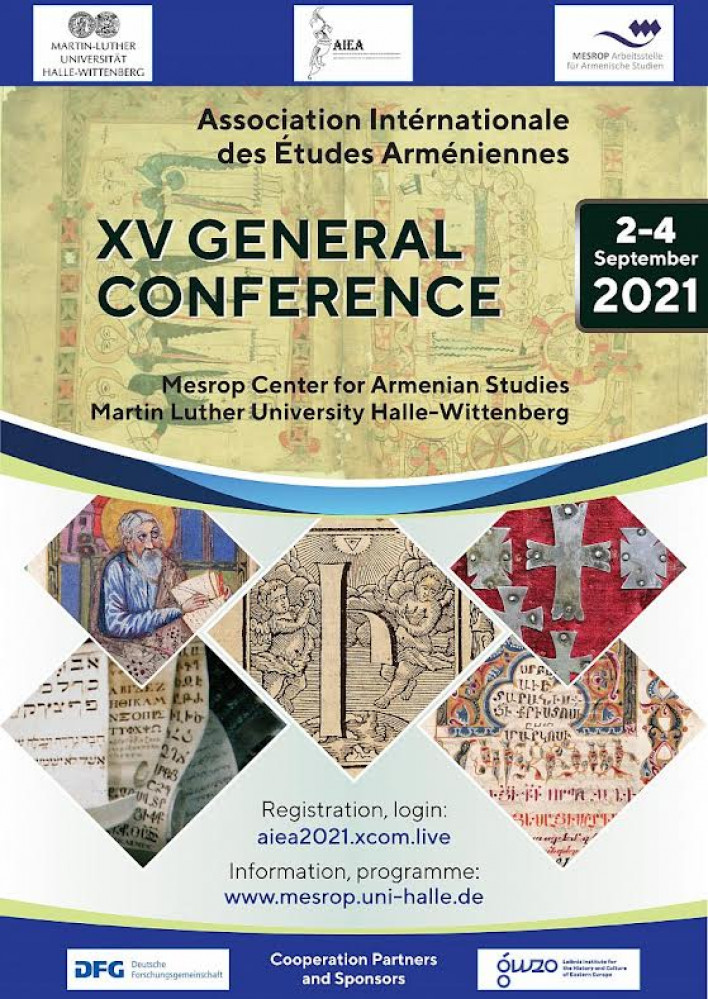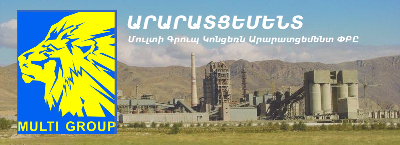Գերմանիայի Հալլեի համալսարանում կայացավ Հայագիտական ուսումնասիրությունների Միջազգային Ընկերակցության 15-րդ Համաժողովը

Սեպտեմբերի 2-ից 4-ը, Գերմանիայի Հալլե-Վիտտենբերգի Մարտին Լյութերի անվան համալսարանում տեղի ունեցավ Հայագիտական Ուսումնասիրությունների Միջազգային Ընկերակցության (Association internationale des études arméniennes - AIEA` facebook.com) 15-րդ Ընդհանուր Համաժողովը, որն այս տարի ընթացավ առցանց ձևաչափով՝ պայմանավորված համաճարակային իրավիճակից բխող սահմանափակումներով, ինչը սակայն, որևէ կերպ չխոչընդոտեց մասնակիցների մեծ թվով ներգրավվածությանն ու աննախադեպ ակտիվությանը:
Հայագիտության ոլորտում այս կարևոր իրադարձությունը նշանավորվեց նաև նրանով, որ այս տարի այն հոբելյանական է՝ լրանում է Հայագիտական Ուսումնասիրությունների Միջազգային Ընկերակցության 40 ամյակը:
Ընկերությունը հիմնադրվել է 1981 թ-ին:
Երեք օր շարունակ՝ շուրջ 100 ներկայացուցիչ՝ աշխարհի 20 երկրներից, այդ թվում՝ հեղինակավոր պրոֆեսորներ ու գիտնականներ, քննարկեցին հայագիտության տարբեր ոլորտներին առնչվող արդի խնդիրներն ու մարտահրավերները:
Գիտաժողովի առաջին օրը բացման խոսքով հանդես եկան և մասնակիցներին իրենց ողջույնը հղեցին AIEA-ի նախագահ Վալենտինա Կալցոլարին, Սաքսոնիա-Անհալթ երկրամասի խորհրդարանի փոխնախագահ Վուլֆ Գալլերթը, Արևելյան Եվրոպայի պատմության և մշակույթի Լայբնիցի ինստիտուտի (GWZO) տնօրեն Քրիստիան
Լյուբքեն , ԳԴՀ-ում ՀՀ դեսպան Աշոտ Սմբատյանը և Հալլեի համալսարանի Մեսրոպ հայագիտական կենտրոնի ղեկավար, AIEA Գիտակազմակերպչական հանձնախմբի անդամ, դոկտոր-պրոֆեսոր՝ Արմենուհի Դրոստ- Աբգարյանը։
ՀՀ դեսպանն իր ելույթում հատուկ անդրադարձ կատարեց համաժողովի կազմակերպիչների և մասնակիցների լայն աշխարհագրությանը` այս համատեքստում ընդգծելով գիտության և մշակույթի միջոցով պետությունների և ժողովուրդների միջև երկխոսություն հաստատելու և համագործակցությունը խորացնելու
առանձնահատկություններն ու կարևորությունը։ Արտերկրում հայագիտության զարգացմանն ուղղված քայլերի առումով շեշտեց «Մեսրոպ» հայագիտական կենտրոնի արժեքավոր գործունեությունը և ունեցած երկարամյա ավանդը:
Կենտրոնի ղեկավար, դոկտոր-պրոֆեսոր՝ Արմենուհի Դրոստ-Աբգարյանն, իր հերթին, մեծ պատիվ համարեց AIEA 15-րդ հոբելյանական Համաժողովը Հալլեում հյուրընկալելու փաստը, միաժամանակ՝ հիանալի նվեր՝ «Մեսրոպ» հայագիտական կենտրոնի ծննդյան տարեդարձին ընդառաջ, որն ամեն տարի նշվում է սեպտեմբերի 6 -
ին: Իր խոսքում տիկին Աբգարյանը շեշտեց, որ չնայած համաճարակով պայմանավորված առկա խոչընդոտներին՝ Համաժողովը հավատարիմ է իր որդեգրած ուղուն և վճռական՝ հետևելու հայագիտության ոլորտում կարևոր հետազոտություններին և օժանդակելու գիտնականների փորձի փոխանակմանը: Այս տարի Համաժողովի պաստառը
և ծրագրային բուկլետը խորհրդանշական կերպով ձևավորված էին 12-րդ դարի Արցախի ավետարանների պատկերով, որը Գերմանիայում ամենահին հայկական ձեռագիրն է և պահվում է Հալլեում:
Համաժողովի եռօրյա նիստերի և դասախոսությունների ընթացքում հայ և այլազգի գիտնականների , ոլորտի առաջատար մասնագետների ու փորձագետների կողմից անդրադարձ կատարվեց արդի խորհրդային և հետխորհրդային շրջանի պատմությանը, հայ միջնադարյան գրականության և բանահյուսության արժեքավոր գործերի քննությանը, արծարծվեցին Իրավունքի պատմութան, քաղաքագիտության, միջմշակութային
հարաբերություններին առնչվող հարցեր: Լիագումար 3 նիստերի ընթացքում հիմնական դասախոսություններով հանդես եկան՝ Վահե Թաշչյանը (Բեռլին)՝ Օսմանյան շրջանի Հայոց պատմության և հայկական մշակութային ժառանգության պահպանության դիտարկումներով, Քրիստինա Մարանչին (Բոստոն)՝ Հայկական եկեղեցիներում
որմնանկարների մասին նոր վկայություններով, իսկ զուգահեռ ընթացող՝ թվով 20 նիստերի ընթացքում հայագիտության թեմաներով ներկայացումներ ունեցան ավելի քան 90 մասնակից, այդ թվում՝ Միքայել Սթոունը, Յանա Չեկանովեցը (Երուսաղեմ)՝ Սուրբ Երկրում հայկական հնագիտության նոր հայտնագործություններով, Ռուբինա Փերումյանը (Լոս Անջելես)՝ Հայաստանում Ստալինի ահաբեկչության թագավորության, Ցեղասպանության վերապրածների հուշերի վկայություններով և այլն:
Ի հավելումն՝ նշենք, որ Հայկական մշակույթի ուսումնասիրությունը Գերմանիայում արմատներ է գցել դեռևս Ռեֆորմացիայի և Լուսավորության դարաշրջանում, ավելին՝ հայոց լեզուն դարձավ Հալլե քաղաքում Ֆրանկեի հիմնադրամների կրթական ծրագրի անբաժանելի մասը: Այս ավանդույթը արմատավորվեց նաև արդի ժամանակաշրջանում՝ և 2010 թվականից սկսած արդեն Հալլեի Մարտին Լյութերի անվան համալսարանում
հայագիտությունը ուսումնական ծրագրի մաս է կազմում, որտեղ գործում է արտապլանային հայագիտական ամբիոն, որը եզակի է Գերմանիայում ՝ իրեն կից գործող Մեսրոպ Մաշտոցի անվան` «Մեսրոպ» հայագիտական հետազոտությունների կենտրոնով հանդերձ: 2021 թվականին «Մեսրոպ» հայագիտական կենտրոնի և Լայբնիցի
Արևելյան Եվրոպայի պատմության և մշակույթի ինստիտուտի (GWZO) միջև կնքվել է համագործակցության պայմանագիր, որի նպատակն է ամրապնդել Հայագիտությունը Կենտրոնական Գերմանիայում երկարաժամկետ հեռանկարում: Երկու գիտական հաստատությունների փոխգործակցության հիմքում ընկած է փորձի փոխանակումը,
համատեղ գիտական և ուսումնական միջոցառումների կազմակերպումը, ինչպես նաև՝ հայագիտության ոլորտում արժեքավոր հրապարակումների տպագրությունը: Հետագայում նախատեսվում է կենտրոնական Գերմանիայում համապատասխան հետազոտական ենթակառուցվածքի ինստիտուցիոնալ համախմբում:
Աննա Վարդանյան
Երևան-Հալլե
The 15th General Conference of the Association internationale des études arméniennes - AIEA was held
on September 2-4 at the Martin Luther University in Halle-Wittenberg, Germany, which went in digital
format this year due to the restrictions caused by epidemic situation, however, this did not in any way
hinder the involvement and unprecedented activity of a large number of participants. This significant
event in the field of Armenology was marked by the fact that this year is a jubilee, the 40th anniversary of
the International Association for Armenological Studies. (It was founded in 1981). For three days, about
100 representatives from 20 countries, including prominent professors and scholars, discussed current
issues and challenges in various fields of Armenology. On the first day of the conference, the participants
were greeted by AIEA President Valentina Calzolari, the Vice-President of the Saxony-Anhalt Parliament
Wolf Gallert, Director of the Leibniz Institute for the History and Culture of Eastern Europe/GWZO
Christian Lubke (Leipzig), RA Ambassador to Germany Ashot Smbatyan, the Head of the MESROP Center
for Armenian Studies, member of AIEA Scientific Organizing Committee Prof.Dr. Armenuhi Drost-Abgarjan
(Halle). In his speech, the RA Ambassador made a special reference to the wide geography of the
conference organizers and participants, by emphasizing in this context the specifications and significance
of establishing a dialogue and enhancing cooperation between states and peoples through science and
culture. He, particularly, stressed the valuable activity of the "Mesrop" Center for Armenology and its
long-term contribution in the development of Armenology abroad. The Head of the Center, Prof. Dr
Armenuhi Drost-Abgaryan, in her turn, considered as not only a great honour to be the 15th host of the
General Conference, but also a great gift on the eve of the birthday of the “Mesrop” Center for Armenian
Studies, which is celebrated each year on September 6th. In her speech, Ms. Abgaryan stressed that
despite the existing obstacles due to the current epidemic situation in the world, the conference is
committed to the path it has taken and determined to pursue essential researches in the field of
Armenology and facilitate the scholarly exchange.
This year the AIEA Jubilee Conference poster and cover of the programme booklet were symbolically
embellished by the Artsakh Gospels from the 12th century, the oldest Armenian manuscript in Germany,
which is kept in Halle.
During the three-day sessions and lectures of the conference, Armenian and foreign scholars, leading
specialists and experts in the field have made a thematic references to the modern history of the Soviet
and post-Soviet period, examination of valuable works of Armenian medieval literature and folklore, were
raised the issues related to the history of law, political science and intercultural relations . During the 3
plenary sessions the keynote lectures were given by Vahan Ter-Ghevondian (Yerevan) on the edition
series of the Matenadaran: Yesterday, Today, Tomorrow, Vahe Tashchyan (Berlin) with his observations
on the Armenian history of the Ottoman period and the preservation issues of the Armenian cultural
heritage, Christina Maranci (Boston) on new evidence for wall paintings in Armenian churches, and during
the 20 parallel sessions, more than 90 participants had performances on Armenology, inter alia, Michael
Stone and Yana Tchekhanovets (Jerusalem) with new discoveries of Armenian inscriptions and
archaeology of the Holy Land, Rubina Peroomian (Los Angeles) on the Stalin’s reign of terror in Armenia
and Genocide survivors’memoirs as testimony, and so forth.
In addition, it should be noted, that the study of Armenian culture took root in Germany during the epoch
of Reformation, Pietism and Enlightenment, furthermore, the Armenian language became an integral part
of the educational program of the Francke Foundations in Halle. This tradition is rooted in the modern era,
as well, and since 2010, Armenology is part of the curriculum at the Martin Luther University Halle-
Wittenberg which is unique in Germany, together with the “Mesrop” Center for Armenian Studies. Since
2021, a cooperation agreement exists between the “Mesrop” Centre for Armenian Studies and the Leibniz
Institute for the History and Culture of Eastern Europe (GWZO). The aim is to strengthen Armenian Studies
in Central Germany in the long term. The collaboration between the two academic institutions focuses on
a mutual exchange of experience between the two cooperation partners, the organisation of joint
academic events, as well as ,publications in the field of Armenology. For the future, an institutional
consolidation of the relevant research infrastructure in Central Germany is planned.
https://mesrop.uni-
halle.de/aiea_konferenz/?fbclid=IwAR0u0ICNUxTTdc6TZsJ9DLT6HuHyA8QJsge24KCAt8ICmncUqfoH9o
WfLrA
Press Release
Anna Vardanyan
Yerevan-Halle
04.09.2021

































